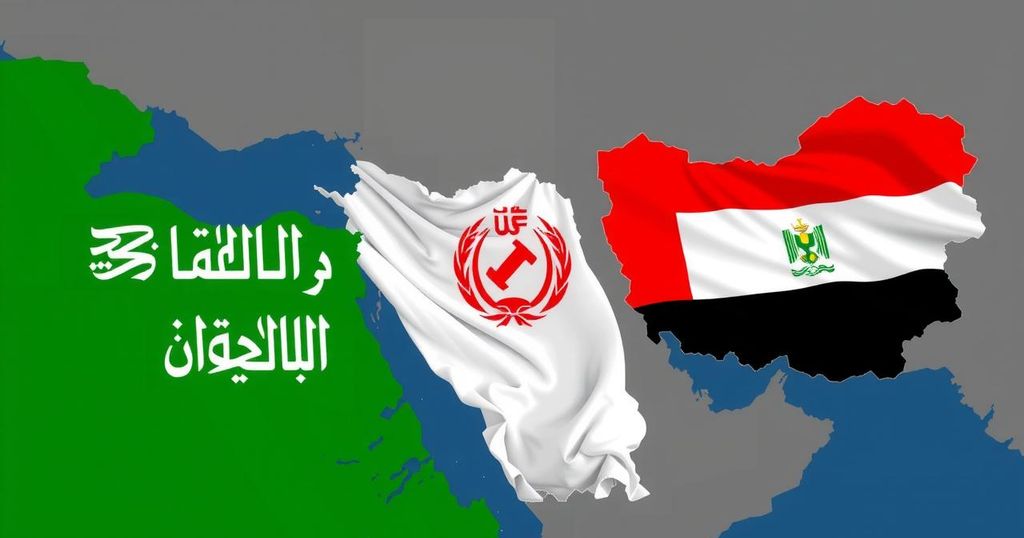Evolving Alliances: The Subtle Support of Saudi Arabia, UAE, and Egypt for Israel Against Iran
Saudi Arabia, the UAE, and Egypt have responded to Israel’s military strike on Iran with a noteworthy shift towards neutrality. Their statements emphasize regional sovereignty and stability instead of outright condemnation of Israel, indicating a potential realignment in diplomatic relations, primarily aimed at curbing Iranian influence and fostering security cooperation.
In a context marked by intricate alliances, Saudi Arabia, the United Arab Emirates (UAE), and Egypt have reacted to Israel’s recent military operations against an Iranian base in an unusually tempered manner. Instead of the anticipated barrage of criticisms toward Israel, their statements were marked by an air of neutrality, suggesting a possible evolution in diplomatic relations among these nations. Each government emphasized language surrounding ‘sovereignty’ and ‘de-escalation,’ deliberately avoiding outright denouncements of Israel’s actions and instead highlighting the broader implications for regional stability. The UAE’s response reflects a diplomatic nuance, denouncing the attack while simultaneously calling for ‘utmost self-restraint.’ The phrasing used by the UAE indicates a preference for dialogue and adherence to international norms, thereby steering the narrative toward diplomacy as opposed to confrontation. This response aligns with the UAE’s broader strategy of economic and security cooperation with Israel, particularly following the Abraham Accords. By centering its discourse on restraint, the UAE implies an underlying recognition of Israel’s security imperatives. Saudi Arabia mirrored this measured response, characterizing the attack as ‘a violation of sovereignty.’ Yet, the kingdom underscored the significance of regional security alongside the sovereignty of states. This tempered tone suggests a strategic recalibration, merging a recognition of Iran’s territorial rights with an implicit understanding of Israel’s counter-Iran measures. The language employed by Riyadh is revealing of a shift in regional alignments, which endeavors to maintain stability without fully isolating Israel. Egypt’s reaction extends this subtle diplomacy, warning of a ‘serious confrontation that threatens regional and international security’ and advocating for a ‘swift ceasefire.’ By broadening the focus, Egypt diverts attention from Israel’s singular actions and emphasizes regional stability, reflecting its historical role as a mediator in Middle Eastern conflicts. This approach is reflective of Egypt’s vested interest in mitigating any potential escalations that could threaten its own borders. These carefully constructed statements unveil more than just a change in rhetoric; they signify a strategic realignment in the Middle East dynamics. Despite their recognized support for the Palestinian cause, these nations prioritize curtailing Iran’s influence and promoting stability at home. This form of ‘supportive condemnation’ indicates a burgeoning acceptance among Saudi Arabia, the UAE, and Egypt of Israel’s role as a counterbalance to Iranian ambitions. In previous times, a military action by Israel would have elicited a unified outcry from Arab nations. However, today’s restrained responses hint at a potential thawing of relations—suggesting that these countries may be starting to view Israel not solely as an adversary but rather as a crucial ally in fostering regional security.
The article examines the evolving diplomatic dynamics in the Middle East, particularly the reactions of Saudi Arabia, the UAE, and Egypt in light of Israel’s military engagements against Iran. It highlights how traditional patterns of condemnation are giving way to more measured responses, suggesting a potential recalibration of alliances focused on shared interests, particularly in countering Iranian influence in the region.
In summary, the reactions from Saudi Arabia, the UAE, and Egypt to Israel’s military actions depict a significant shift in regional attitudes. The finesse within their statements reflects a strategic realignment where traditional enmities are being reassessed in favor of mutual security concerns. This evolving perspective may pave the way for a future where Israel is increasingly recognized as a collaborator in sustaining regional stability, rather than merely as a regional adversary.
Original Source: www.jpost.com




Post Comment